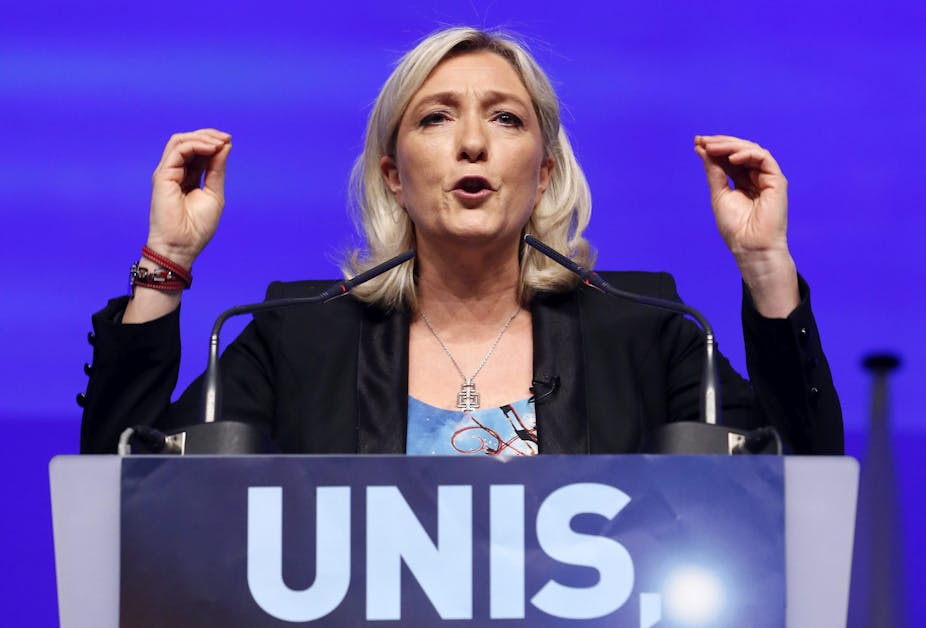The rise of the Tea Party in the US and the electoral success of both nationalist populists in Europe and the Abbott government in Australia demonstrates there are many parties with positions described as “right wing”. And yet, there are vast ideological differences between them.
The political compass is a useful tool when trying to define parties and politicians with a degree of precision. This is particularly the case as new parties, politicians and entire party families are becoming increasingly significant players.
The compass describes two axes: the horizontal economic axis and the vertical values axis. The economic axis runs from a state control position in the west, to a free market position in the east, while the values axis runs from a socially liberal attitude in the south to an authoritarian position in the north.
For example, for libertarians, market freedom and personal liberty is paramount: you can make and spend your money as you see fit and there will be very little – if any – government interference (or taxes, but this means no guaranteed medical care or education for the less affluent).
The state has no business interfering in what people say or how they feel, including speech that is contentious or offensive to others. For committed libertarians, this freedom extends to sexual, self-defence and drug choices.
As shown below, there are four sectors: the libertarian left (social liberals) and right (conservatives), and the authoritarian left (socialists) and right (communitarians or traditionalists).
The compass below shows the ideological positioning of the main parties in Australia’s 2013 federal election. The policy distance between the Liberal, Labor and National parties is relatively small. The Greens represent the liberal left quadrant and Katter’s Australian Party represent the socially conservative and economically centre to centre-left.
Though the compass is a far from perfect measure, it’s useful in providing a macro view of Australian politics and demonstrates where most parties are clustered. Australia’s major political parties tend to be those that support free markets but are opposed to social liberalism. This is perhaps best symbolically represented in the major parties by Liberal senator Cory Bernardi.
As you’ll notice there’s a big space in the libertarian right. Due to Australia’s political culture this is unlikely to be filled in the near future, though the influence of free-market thinktank the Institute of Public Affairs on the Liberal Party is considerable. As a political orientation, libertarianism is most pronounced in the US, and is increasingly being felt in the Republican Party.

In the US, the most famous of the libertarians was former Republican representative Ron Paul. Paul was avidly opposed to military intervention in foreign lands and supported the legalisation of drugs. He sounds like a good fit for the Greens until his strong advocacy of the right to bear arms and intention to abolish the Federal Education Department are considered.
For Paul it was all about liberty, the US Constitution and limited government. Paul’s son Rand, more a politician than his father, is very likely to be one of the leading contenders for the Republican presidential nomination in 2016.
On the other side of the Atlantic, there’s another political movement often deemed to be ideologically aligned with the Tea Party. This is not the case. While elements within the Tea Party are socially conservative, their principal enemy is government.

But for Marine Le Pen, leader of the France’s Front National, the ideal state is represented as a bulwark, protecting French workers, small and medium businesspeople against globalisation’s rapaciousness, and the destruction of French identity via global consumerism and mass immigration. Much like Katter’s Australian Party, the economic position of the Front National opposes selling off government assets deemed essential.
The Front National is likely to defeat the established parties at the upcoming European parliament elections.
Staying in Europe, and in the wake of the 2002 assassination of gay, erudite Dutch politician Pim Fortuyn – who may be best described as an anti-Islamist liberal populist – arose Geert Wilders. Wilders is the most intense of the anti-Islamist politicians in western Europe.
In contrast to the Front National, Wilders’ Party for Freedom is economically liberal. Wilders has a great admiration for Margaret Thatcher, while Marine Le Pen looks towards De Gaulle in accord with the notion of “dirigisme” (state intervention in economic development) and his focus on French independence.
Wilders’ Party for Freedom leads the polls in the Netherlands. It also recently helped inspire the launch of a similar party in Australia, the Australian Liberty Alliance.

In line with developments in western Europe, Australia’s current political environment is possibly supportive of a nationalist populist type party. Secure jobs are being lost to countries with fewer worker protections and lower wages; the likelihood of unpopular asset sales; stressed infrastructure in the big cities due partly to rapid population growth; wealthy foreign investors exacerbating an extant housing boom pricing out younger middle- and low-income Australians from owning a home: these are all creating an uncertain economic future for some.
But perhaps the biggest difference in Australia as compared to Europe is that no electorally significant party makes Islamism a core issue.
The supply factors for nationalist populist parties are limited. Bob Katter’s leadership style and policies are best suited to Far North Queensland and no other parties poll significantly.
When it comes to issues of foreign intervention you’d be hard pressed to find more divergent opinions than those espoused by Ron Paul and hawkish fellow Republican John McCain, or the positions of Bernardi and Turnbull when it comes to gay marriage, or the neoliberals and the nationalist populists when it comes to selling off state assets or mass immigration.
As new party families and politicians enter the fray, “right”, just like “left”, becomes a barely useful term due to the hybrid nature and divergent platforms of today’s parties and politicians.

